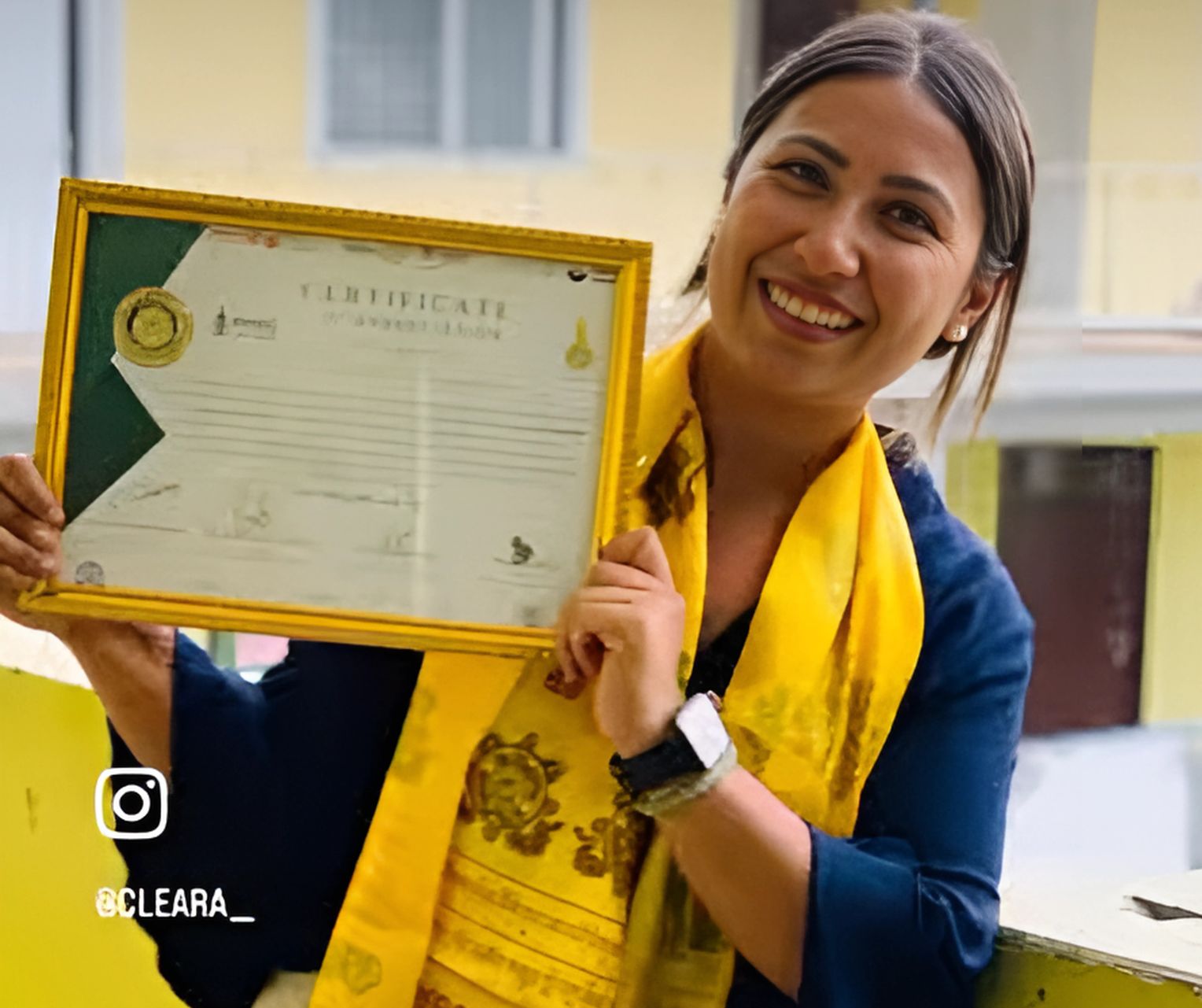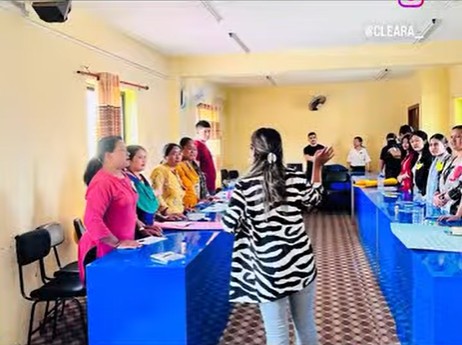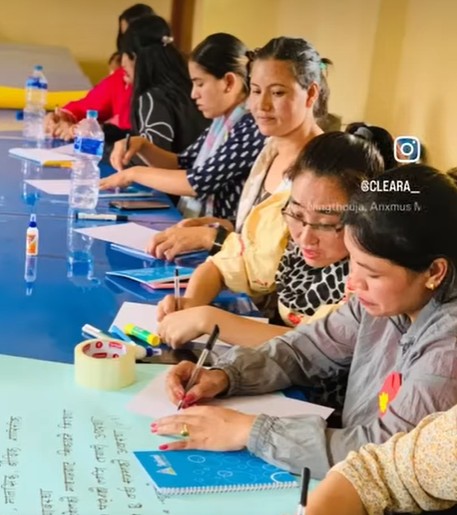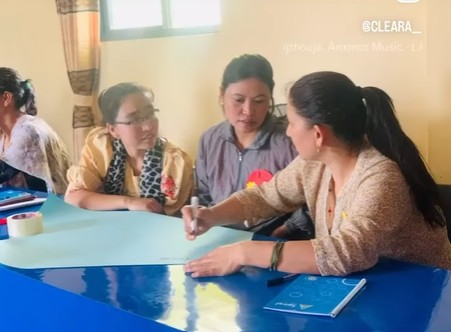A Reflective Journey into Classroom Transformation
A Reflective Journey into Classroom Transformation
“Come Out from the Comfort Zone!” – A Reflective Journey into Classroom Transformation
Training by Ms. Priyanka Chaguthi, Early Childhood Educator | Organized by Vygotsky Nepal
“Staying in your comfort zone is like living in a bubble—safe, but limiting. 🫧”
With this powerful thought, I had the privilege of facilitating a training session that would challenge long-held teaching habits and open new doors of learning for a group of experienced educators.
A few months ago, in collaboration with the Rotaract Club of Mahabauddha and Bani Balis Secondary School, I was invited to conduct an insightful and highly interactive professional development session with pre-primary and primary level teachers. These educators had several years of experience in the classroom, and while that experience was valuable, it was also apparent that many were still confined within traditional teaching methods—firmly rooted in paper-pencil-based learning, limiting both their own growth and that of their students.
As the session began, I sensed a mix of anticipation and hesitation. Some teachers were visibly curious, while others seemed comfortable with their current approach. I was not surprised when many admitted they were still engaging children almost exclusively with books and notebooks—overlooking the vast world of sensory, physical, emotional, and social development that forms the foundation of early childhood education.
The aim of the training wasn’t just to provide information—it was to provoke thought, invite exploration, and offer tools to evolve. Together, we initiated discussions about the holistic development of children—emphasizing that young learners spend more than 50% of their time at school, and that time must contribute to their complete development: physical, cognitive, emotional, linguistic, and social.
To bring this message to life, I incorporated peer learning activities, group discussions, and hands-on experiences. Teachers were encouraged to step away from passive listening and instead participate in creating, exploring, and questioning. When given the opportunity to work collaboratively in groups, many began to show signs of renewed curiosity. They started asking questions, sharing challenges from their classrooms, and suggesting ideas—each moment unfolding new insights and possibilities.
One of the highlights for me was when we introduced different classroom materials and teaching aids. The goal wasn’t simply to show resources but to help teachers create them, adapt them, and implement them. Watching educators design their own materials—eager to try something new, making mistakes, and learning from them—was truly heartening. These materials ranged from storytelling aids to sensory play tools, from visual charts to games designed for language and math learning.
The feedback I received from participants was deeply encouraging. Many teachers expressed how much they appreciated being pushed gently but firmly out of their comfort zones. They realized how important it is to bring change not just for the sake of innovation, but because today’s learners deserve a classroom that reflects their needs, their interests, and their growth potential.
Of course, not everyone was on the same page. While several teachers were excited, open-minded, and motivated to transform their classroom environments, there were a few who resisted change. They preferred to stay within their well-practiced routines—believing, perhaps, that what had worked for years need not be altered. It was a reminder that professional development is not just about sharing ideas, but about shifting mindsets.
And yet, even if only a few sparks ignite, that’s enough to begin a fire. I was deeply inspired by those teachers who showed genuine willingness to try something new, even if it was uncomfortable. The courage to say, “I don’t know, but I’m ready to learn,” is far more powerful than staying complacent. I reminded them that in the world of education, it’s not about passing or failing—it’s about trying. Because trying is learning, and learning is growth.
I firmly believe that growth starts when we step outside our comfort zones. As educators, if we expect our students to be curious, adaptive, and open to learning, then we must first embody those traits ourselves. We cannot guide our students into the future if we ourselves are anchored to the past.
I closed the session with a reflection I hold dear:
“In the ever-changing sea of education, those who refuse to sail will be left stranded on stagnant shores. Dive into the currents of learning to navigate the waves of progress.”
To every teacher reading this—know that transformation is a process. It takes time, intention, and courage. You don’t have to overhaul your classroom overnight. Just begin. Start with one new idea, one change in perspective, one step out of the comfort zone.
I am grateful to Vygotsky Nepal - Child-Parent Consulting and Learning Center for offering me the platform to reach and work with such dedicated educators. I also extend my thanks to the Rotaract Club of Mahabauddha and Bani Balis Secondary School for believing in the power of teacher development and initiating this collaboration.
To the teachers who embraced the challenge—thank you for inspiring me. I carry your stories, your questions, and your efforts with me wherever I go. I too learn in every session I deliver, and this one reminded me once again of the endless possibilities we hold in our hands as educators.
Let’s continue to learn. Let’s continue to grow. And let’s never forget that even one step out of the comfort zone is a step toward transformation.
#VygotskyNepal #ComeOutOfTheComfortZone #TeacherTraining #EarlyChildhoodEducation #ProfessionalDevelopment #TransformingClassrooms #LearningJourney #BaniBalisSchool #RotaractMahabauddha #PriyankaChaguthi #GrowthMindset #TeacherEmpowerment
Inquire Now



A two-day workshop aimed at empowering pre-prim...
Empowering Educators, Enriching Childhoods An ...
It’s not every day that you walk into a s...
My recent experience in Golanjor-4, Ranikhola, ...
As someone who believes in making the most of e...
“Know Your Child’s Brain&rdqu...
Smart Parenting Nepal recently hosted a highly ...
One-Day Training Recap: Know Your Child’s...
Bihani Kiran School has successfully completed ...
Darshan Child Care successfully completed a fiv...

